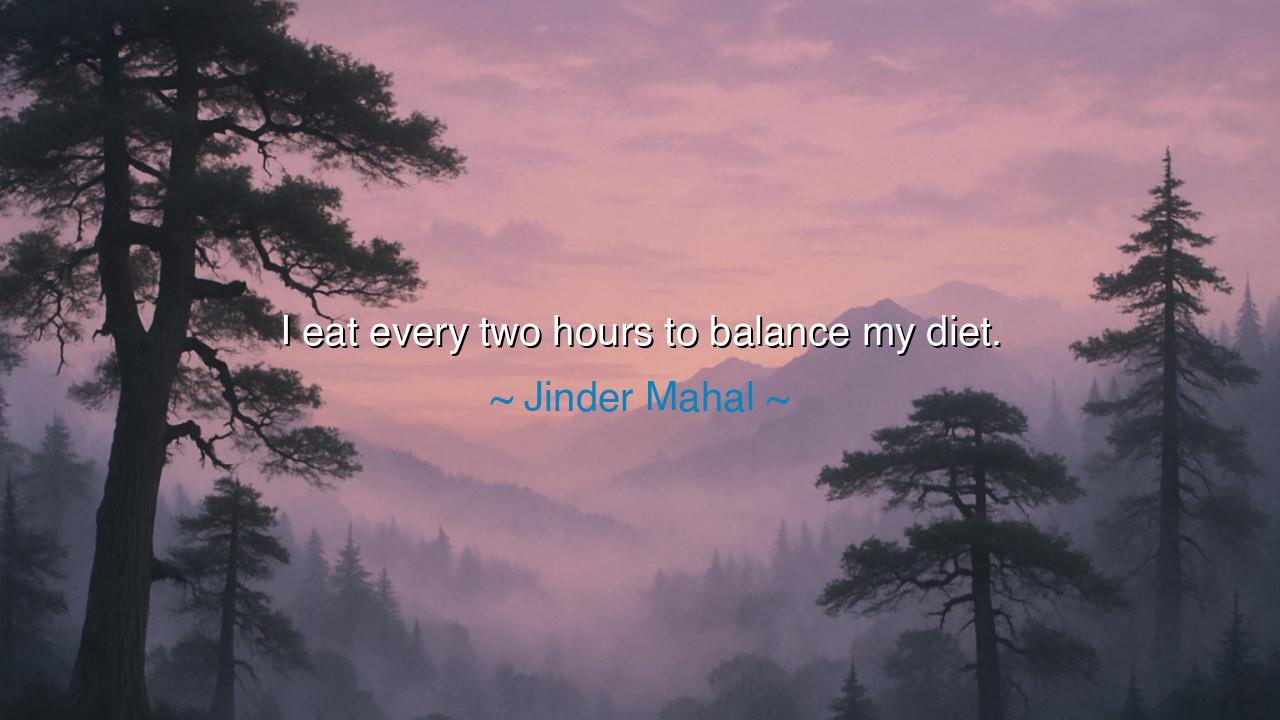
I eat every two hours to balance my diet.






Hear now the words of Jinder Mahal, a modern-day sage who speaks with the discipline and strength of one who understands the importance of balance in all things: "I eat every two hours to balance my diet." These words carry within them not just a strategy for maintaining physical health, but a timeless lesson in the importance of moderation, discipline, and the understanding of one’s own needs. For the act of eating is not merely a physical necessity, but an opportunity to bring harmony to the body, mind, and spirit.
In the ancient world, great thinkers and philosophers such as Hippocrates taught that the path to health was through balance and moderation. The great physician understood that the body is a vessel, and like any vessel, it must be nourished with care. His teachings emphasized that diet, exercise, and rest must be balanced to maintain health. Jinder Mahal echoes this wisdom in his approach to eating: by nourishing the body regularly, he creates the necessary foundation for strength, endurance, and vitality. Just as the ancients understood that the body requires consistent care, Mahal’s approach is a modern reflection of this ancient wisdom—an approach that sees diet not as a fleeting trend, but as a continual practice of balance.
Reflect upon the example of Alexander the Great, whose military conquests were as legendary as his discipline. Alexander’s army, though fierce and relentless, was also marked by careful planning and balance. Their daily routines were not merely about battle; they were about preparing the body to endure the rigors of war. Just as the soldiers ate to fuel their strength, Alexander himself knew that maintaining a steady balance of nutrition, rest, and exercise was vital for both his health and leadership. In the same way, Jinder Mahal understands that to be a champion, one must nourish the body consistently, not through extremes, but through a disciplined, balanced approach that supports sustained strength.
The diet of ancient Roman gladiators offers another poignant example of this wisdom. Gladiators, despite their brutal profession, were often highly trained athletes who followed specific regimens to maintain their power and endurance. Their meals were carefully balanced to provide them with the necessary fuel for combat. They knew that constant nourishment—eating regularly—was vital to keep their bodies strong and their minds sharp. Much like these ancient warriors, Jinder Mahal understands that in order to reach one’s peak potential, the body must be given consistent care, not just in terms of what is consumed, but when and how often. This sense of balance in nourishment mirrors the teachings of the ancients, who viewed the body not as a machine to be overworked, but as a living entity to be tended to with reverence and regular care.
In contrast, let us reflect on the stories of those who fell into the trap of extremes. Diogenes, the philosopher known for his ascetic lifestyle, rejected all luxuries, including food. Yet his neglect of his body ultimately led him to a life of discomfort and harshness. His example serves as a reminder that excessive deprivation, much like excessive indulgence, is harmful to the body and mind. To live in balance—eating regularly, providing the body with the sustenance it requires without excess—was a lesson Diogenes never truly embraced, and it led him into a life of bitterness and resentment toward his own humanity. Jinder Mahal speaks against this extreme, recognizing that the act of eating every two hours is a practice that honors the body’s natural rhythms, providing it with the fuel necessary to remain strong and healthy.
In our modern lives, we too are faced with the temptation of extremes. We may either overindulge in food or restrict ourselves to such harsh measures that our bodies become weak and weary. Jinder Mahal offers a middle path—a practice of moderation and balance that allows us to nourish the body without falling prey to the dangers of excess or deprivation. His approach teaches us that health is not a destination but a continual process of tending to the needs of the body, mind, and spirit. Just as the great warriors of old ate to fuel their strength, so too must we nurture ourselves in a way that honors our inherent humanity.
Let us take this lesson into our own lives. In a world that constantly urges us to chase after quick fixes, fad diets, or unattainable ideals, the wisdom of Jinder Mahal calls us to slow down, to honor our bodies, and to adopt a steady, disciplined approach to nourishment. Whether you are a warrior on the battlefield of life or a student striving for wisdom, your body is your ally. Feed it regularly with the right balance, and it will serve you well. Remember, health is not a matter of extremes, but of consistent, mindful care. Like the ancient warriors, like the philosophers of old, nourish your body regularly and wisely, and you will find the strength to face whatever challenges come your way.
Therefore, O future generations, heed this timeless lesson: to live a life of strength and health is not to indulge in excess or to suffer in deprivation, but to find the balance that sustains you. Eat, not in desperation or indulgence, but with awareness, giving your body the fuel it needs to thrive. Let moderation guide your diet, and through this steady, disciplined practice, you will achieve true vitality and strength.






AAdministratorAdministrator
Welcome, honored guests. Please leave a comment, we will respond soon